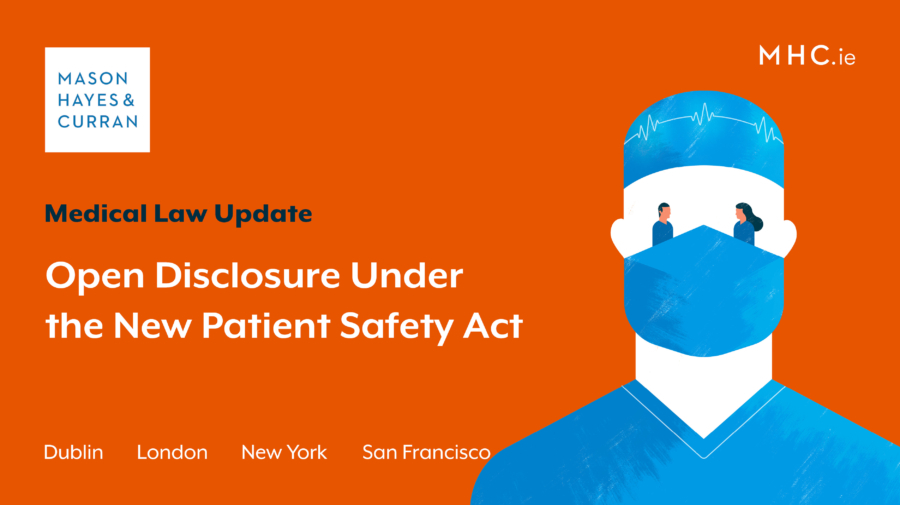Open Disclosure Under the New Patient Safety Act

Landmark new legislation implements mandatory open disclosure for the first time in Irish law. Our Medical Law team reviews the key impacts of the new Patient Safety (Notifiable Incidents and Disclosure) Act 2023.
Prior to this legislation, disclosure has been voluntary under Part 4 of the Civil Liability (Amendment) Act 2017. It has been well accepted that open disclosure is the appropriate ethical and professional approach to an adverse incident and this has been reflected in the Health Service Executive (HSE) Open Disclosure Policy since 2013.
The intention of the new Act is to bring about cultural change, enhance learning and ensure that openness and transparency are embedded across the health service.
What constitutes a ‘notifiable incident’?
Schedule 1 of the Act sets out the list of ‘notifiable incidents’ which are now subject to mandatory open disclosure. These broadly include the following incidents resulting in death:
- Wrong site surgery or wrong surgical procedure surgery resulting in unintended and unanticipated death
- Unintended retention of a foreign object after surgery resulting in an unanticipated death
- Any unintended and unanticipated death occurring in an otherwise healthy patient undergoing elective surgery, or where a health service provider provides a service that is directly related to any medical treatment. The death must not have arisen from the illness or an underlying condition of the patient
- Patient death associated with a medication error or due to transfusion of ABO-incompatible blood or blood components
- An unanticipated death of a woman while pregnant, or within 42 days of the end of the pregnancy
- An unanticipated and unintended stillborn child or perinatal death
- An unintended death where the cause is believed to be the suicide of a patient within a health service setting
Schedule 2 of the Act includes a baby who requires or is referred or considered for therapeutic hypothermia.
Section 8 empowers the Minister to prescribe additional incidents as notifiable incidents providing they meet certain criteria.
Section 6 sets out the obligation on health service practitioners to notify the health service provider of the occurrence of the notifiable incident as soon as practicable.
Section 27 requires the health service provider to notify the relevant external body within 7 days. Depending on the provider involved this will be HIQA, Chief Inspector of Social Services or Mental Health Commission.
Open disclosure meeting
Section 5 requires that where a health service provider is satisfied that a ‘notifiable incident’ has occurred, it shall hold a meeting in order to make open disclosure of the incident to the patient and/or ‘relevant person’. The meeting should be led by the principal health service practitioner responsible for the patient’s care, unless the circumstances of the incident dictate otherwise.
Section 18 outlines the information to be provided at the meeting including the date and description of the incident, when it came to the attention of the healthcare provider and the physical/psychological consequences for the patient. It also provides for the making of an apology where appropriate.
Inadmissibility of evidence in court proceedings
Importantly for health service providers and their insurers, Section 10 provides protection in that any information provided during the course of the open disclosure meeting, including an apology, shall not:
- Invalidate insurance
- Constitute admission of liability
- Be admissible as evidence in proceedings
Sanction for non-compliance
Section 77 provides that failure to comply with open disclosure of a notifiable incident without reasonable excuse will be a criminal offence. It is significant that criminal sanction is a feature of this legislation.
Guidelines
Section 77 provides for the issue of guidelines “for the purpose of providing practical guidance as regards the operation of, and compliance with, this Act”. This guidance will be important to the successful implementation of the new legislation.
It is understood that preparatory steps are currently being progressed and stakeholder engagement is now taking place across the health service to facilitate the implementation of the Act and in particular the notification process. An open disclosure training policy and communications plan is underway.
Conclusion
This legislation represents a paradigm shift to a mandatory regime of open disclosure with the aim of changing culture and embedding open honest communication of adverse events in the healthcare setting.
It is important that health practitioners familiarise themselves with the mandatory obligations and are supported to engage positively with the changing environment.
For more information on ensuring full compliance with the new legislation, contact a member of our Medical Law team.
The content of this article is provided for information purposes only and does not constitute legal or other advice.
Share this:




